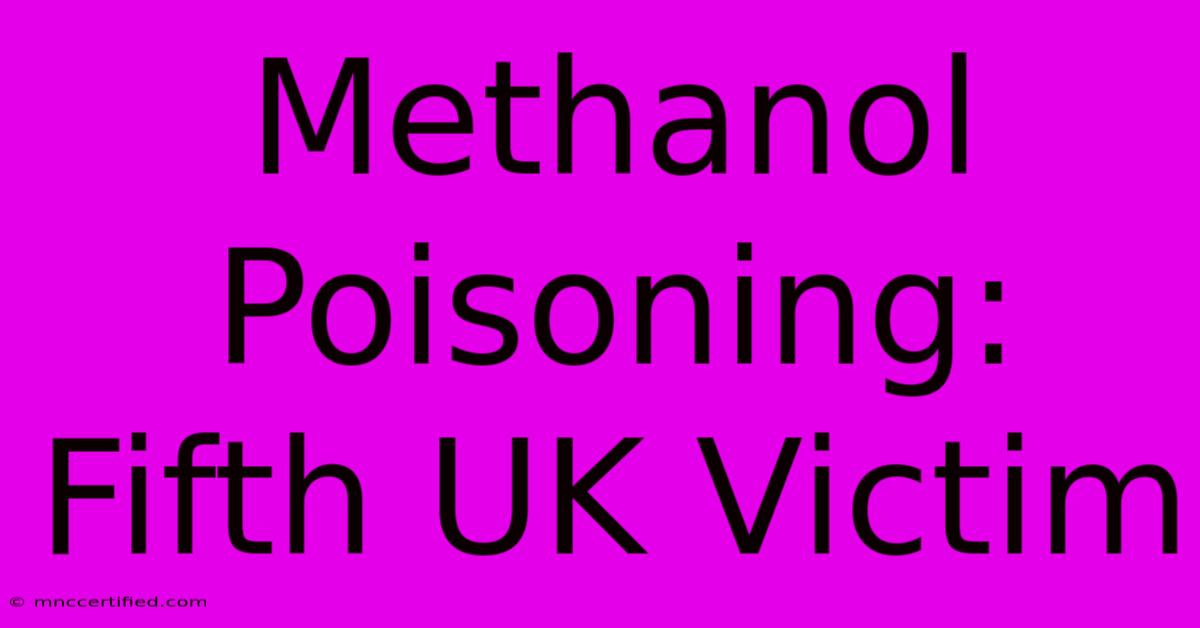Methanol Poisoning: Fifth UK Victim

Table of Contents
Methanol Poisoning: Fifth UK Victim Highlights Dangers of Contaminated Alcohol
The recent death of a fifth victim in the UK due to methanol poisoning underscores a serious and often overlooked public health crisis. This tragic incident highlights the devastating consequences of consuming contaminated alcohol and the urgent need for increased public awareness and stricter regulations. This article will delve into the details of this latest case, explore the dangers of methanol poisoning, and discuss preventative measures.
Understanding Methanol Poisoning
Methanol, also known as methyl alcohol or wood alcohol, is a highly toxic substance. Unlike ethanol (the type of alcohol found in alcoholic beverages), methanol is not metabolized safely by the body. Instead, it's converted into formaldehyde and formic acid, which are extremely harmful and can cause severe damage to the eyes, nervous system, and other vital organs.
Symptoms of methanol poisoning can range from mild to severe, and may include:
- Early Symptoms: Headache, nausea, vomiting, blurred vision, abdominal pain.
- Severe Symptoms: Severe abdominal pain, blindness, seizures, respiratory failure, coma, and death.
The severity of symptoms depends on the amount of methanol ingested and the individual's health status. Even small amounts can cause serious health problems, and delayed treatment can be fatal.
The Fifth UK Victim and the Ongoing Investigation
The recent death marks the fifth fatality linked to methanol poisoning in the UK within a short period. While investigations are ongoing, authorities suspect the source of the contamination is illicitly produced alcohol. This highlights the dangers of purchasing alcohol from unregulated sources, particularly those offering suspiciously low prices.
Authorities are working diligently to trace the source of the contaminated alcohol and prevent further incidents. This involves collaborating with law enforcement agencies, public health organizations, and retailers to identify and remove contaminated products from circulation. The investigation underlines the importance of robust supply chain monitoring and stricter penalties for those involved in the production and distribution of illicit alcohol.
Preventing Methanol Poisoning: A Call to Action
The tragic events underscore the vital need for proactive measures to prevent future methanol poisoning cases:
- Only consume alcohol from reputable sources: Purchase alcoholic beverages from licensed retailers and avoid buying from unknown sellers or at suspiciously low prices.
- Be aware of symptoms: If you or someone you know experiences symptoms after consuming alcohol, seek immediate medical attention. Early treatment is crucial in minimizing the risk of permanent damage or death.
- Educate others: Spread awareness about the dangers of methanol poisoning and the importance of consuming alcohol responsibly and from safe sources.
- Support stricter regulations: Advocate for tighter regulations on alcohol production and distribution to prevent the sale of contaminated products.
The Role of Public Health Initiatives
Public health campaigns play a vital role in raising awareness about the dangers of methanol poisoning. These campaigns should focus on educating the public about the symptoms, risks, and preventative measures. Clear and concise messaging, using various media channels, is key to reaching a broad audience. Furthermore, collaboration between government agencies, health organizations, and community groups is essential in delivering effective public health interventions.
Conclusion:
The death of the fifth victim in the UK due to methanol poisoning is a stark reminder of the dangers of consuming contaminated alcohol. Increased public awareness, stricter regulations, and proactive measures are crucial in preventing future tragedies. By working together, we can protect communities from the devastating effects of methanol poisoning. The focus should remain on responsible alcohol consumption and sourcing from reputable retailers. Only through a combined effort can we effectively tackle this serious public health threat.

Thank you for visiting our website wich cover about Methanol Poisoning: Fifth UK Victim. We hope the information provided has been useful to you. Feel free to contact us if you have any questions or need further assistance. See you next time and dont miss to bookmark.
Featured Posts
-
Dry Insurance Chagrin Falls Ohio
Nov 22, 2024
-
Judge Overturns Smollett Verdict
Nov 22, 2024
-
Icc Warrants Netanyahu Gallant Hamas
Nov 22, 2024
-
Pet Food Manufacturing Insurance
Nov 22, 2024
-
Unison Remembers John Prescott
Nov 22, 2024